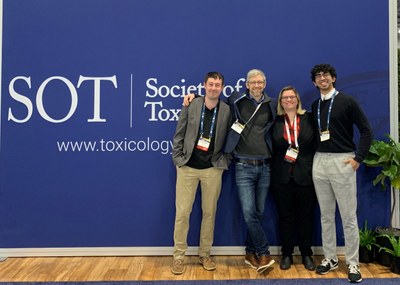Alex P. Carll, Ph.D., M.S.P.H.


ALEX P. CARLL, Ph.D., M.S.P.H.
Assistant Professor (Tenure Track)
alex.carll@louisville.edu
University of North Carolina, 2012
Exposure to airborne toxicants is tied to arrhythmia, cardiac arrest, and heart failure in the general public. Our team seeks to validate and better understand these associations. We investigate how inhaled toxicants impair cardiac conduction and contraction in both rodents and humans, with particular interest in the nervous system’s role. We study the impacts of multiple toxicants, including e-cigarette aerosols, volatile organic compounds, and particulate matter from many sources (automobiles, urban atmospheres, and consumer products).
Current Investigative Questions
In both rodents and humans, the Carll lab investigates;
- What are the neural and cellular pathways underlying pollutant-induced myocardial dysfunction and remodeling?
- How do e-cigarette aerosols adversely affect cardiac function, intracellular signaling, and neuroregulation?
- How do constituents contribute to the cardiac risks of exposure to e-cigarette aerosols?
Findings
Our recent findings suggest that tobacco product aerosols alter cardiac conduction and promote arrhythmia in both mice and humans through autonomic, neural, and endocrine pathways.
Education
Post-Doc, 2013-2015, Harvard University, T.H. Chan School of Public Health, Molecular and Integrative Physiological Sciences.
Ph.D. 2012, University of North Carolina (UNC)-Chapel Hill, Gillings School of Global Public Health, Environmental Health Sciences.
M.S.P.H. 2008, UNC-Chapel Hill, School of Public Health, Environmental Sciences & Engineering.
A.B. 2004, Duke University, Environmental Science & Policy
Prior Training
Pre-doctoral Fellow, 2006-2012, U.S. Environmental Protection Agency, National Health and Environmental Effects Research Laboratory, Cardiopulmonary and Immunotoxicology Branch.
Post-doctoral Research Fellow, 2013-2015, Harvard School of Public Health, Dept. of Environmental Health, Program in Molecular and Integrative Physiological Sciences
Selected Publications
- Kucera C, Ramalingam A, Srivastava S, Bhatnagar A, Carll AP. Nicotine formulation influences the autonomic and arrhythmogenic effects of electronic cigarettes (2024). Nicotine Tob Res. 26(4):536-544. PMID: 38011908.
Carll AP, Arab C, Salatini R, Miles MD, Nystoriak MA, Fulghum KL, Riggs DW, Shirk GA, Theis WS, Talebi N, Bhatnagar A, Conklin DJ (2022). E-cigarettes and their lone constituents induce cardiac arrhythmia and conduction defects in mice. Nature Communications. 13(1):6088. PMID: 36284091. PMCID: PMC9596490.
- Raimundo RD, Sata MA, Dias da Silva T, de Abreu LC, Valenti VE, Riggs DW, Carll AP (2021). Open and Closed Endotracheal Suction Systems Divergently Affect Pulmonary Function in Mechanically Ventilated Subjects – a quasi-randomized clinical trial. Respir. Care. 66(5):785-792.PMID: 33688090.
- Irfan AB, Arab CA, DeFilippis AP, Lorkiewicz PL, Keith RJ, Xie Z, Bhatnagar A, Carll AP (2021). Smoking accelerates atrioventricular conduction in humans concordant with increased dopamine release. Cardiovasc Toxicol. 21(2):169-178. PMID: 33043409. PMCID: PMC7855806.
Carll AP, Salatini R, Pirela SV, Wang Y, Xie Z, Lorkiewicz P, Naeem N, Qian Y, Castranova V, Godleski JJ, Demokritou P (2020). Inhalation of Printer-Emitted Particles Impairs Cardiac Conduction, Hemodynamics, and Autonomic Regulation and Induces Arrhythmia and Electrical Remodeling in Conscious Rats. Particle & Fibre Toxicology .(1):7. PMID: 31996220. PMCID: PMC6990551.
Conklin DJ, Schick SF, Blaha MJ, Carll AP, DeFilippis A, Ganz P, Hall ME, Hamburg NM, O'Toole TE, Reynolds LM, Srivastava S, Bhatnagar A (2019). Cardiovascular injury induced by tobacco products: Assessment of risk factors and biomarkers of harm: A Tobacco Center of Regulatory Science (TCORS) Compilation. Am J Physiol Heart Circ Physiol. 316(4):H801-H827. PMID: 30707616.
- Carll AP, Farraj AK, and Roberts AM, (2018). The Role of the Autonomic Nervous System in Cardiovascular Toxicity. In: McQueen, C.A. (ed.), Comprehensive Toxicology, 3e, Vol. 13, Oxford: Elsevier Ltd. Pp. 61-114. ISBN 9780081006016. DOI: 10.1016/B978-0-12-801238-3.64259-9.
- da Silva TD, Massetti T, Crocetta TB, Monteiro CBD, de Abreu LC, Oliveira FR, Arbaugh C, Carll A, Godleski JJ, Ferreira C (2018). Heart rate variability and cardiopulmonary dysfunction in patients with Duchenne muscular dystrophy. Pediatric Cardiology. 39(5):869-883 PMID: 29696428.
Carll AP, Crespo SM, Zati DH, Filho MS, Zati DH, Coull BA, Diaz EA, Raimundo RD, Jaeger TNG, Ricci-Vitor AL, Papapostolou V, Lawrence JE, Garner DM, Perry BS, Harkema JR, Godleski JJ (2017). Inhaled ambient-level traffic-derived particulates decrease cardiac vagal influence and baroreflexes and increase arrhythmia in a rat model of metabolic syndrome. Particle & Fibre Toxicology. 14(1):16. PMID: 28545487.
Carll AP, Haykal-Coates N, Winsett DW, Hazari MS, Ledbetter AD, Richards JH, Cascio WE, Costa DL, Farraj AK (2015). Cardiomyopathy confers susceptibility to particulate matter-induced oxidative stress, vagal dominance, arrhythmia, and pulmonary inflammation in heart failure-prone rats. Inhalation Toxicology 27(2):100-12.
Carll AP, Lust RM, Hazari MS, Perez CM, Krantz QT, King C, Winsett DW, Cascio WE, Costa DL, Farraj AK (2013). An Autonomic Link between Inhaled Diesel Exhaust and Impaired Cardiac Performance: Insight from Treadmill and Dobutamine Challenges in Heart Failure-Prone Rats. Toxicological Sciences. 135(2):425-36.
Carll AP, Lust RM, Hazari MS, Perez CM, Krantz QT, King C, Winsett DW, Cascio WE, Costa DL, Farraj AK (2013). Diesel Exhaust Inhalation Increases Cardiac Output, Bradyarrhythmias, and Parasympathetic Tone in Aged Heart Failure-Prone Rats. Toxicological Sciences. 31(2):583-95.
Carll AP, Hazari MS, Perez CM, Krantz QT, King C, Winsett DW, Costa DL, Farraj AK (2012). Whole and Particle-Free Diesel Exhausts Differentially Affect Cardiac Electrophysiology, Blood pressure, and Autonomic Balance in Heart Failure-Prone Rats. Toxicological Sciences. 128(2):490-9.
Carll AP, Haykal-Coates N, Winsett DW, Hazari MS, Nyska A, Richards JH, Willis MS, Costa DL, Farraj AK (2011). Dietary salt exacerbates isoproterenol-induced cardiomyopathy in rats. Toxicologic Pathology.39(6):925-37.
Carll AP (review), Willis MS, Lust RM, Costa DL, Farraj AK (2011). Merits of Non-Invasive Rat Models of Left Ventricular Heart Failure. Cardiovascular Toxicology. 11(2):91-112.
Carll AP, Haykal-Coates N, Winsett DW, Rowan WH 3rd, Hazari MS, Ledbetter AD, Nyska A, Cascio WE, Watkinson WP, Costa DL, Farraj AK (2010). Particulate matter inhalation exacerbates cardiopulmonary injury in a rat model of isoproterenol-induced cardiomyopathy. Inhalation Toxicology. 22(5):355-68.
Lab Members
Anand Ramalingam, PhD – Postdoctoral Researcher
Sean Raph, PhD – Postdoctoral Researcher
Brittany Reynolds, BS – Doctoral Student
Romith Paily – Undergraduate Student
CARLL LABORATORY is available at https://louisville.edu/envirome/research/laboratories/alex-carll-laboratory
 Facebook
Facebook Twitter
Twitter Linkedin
Linkedin